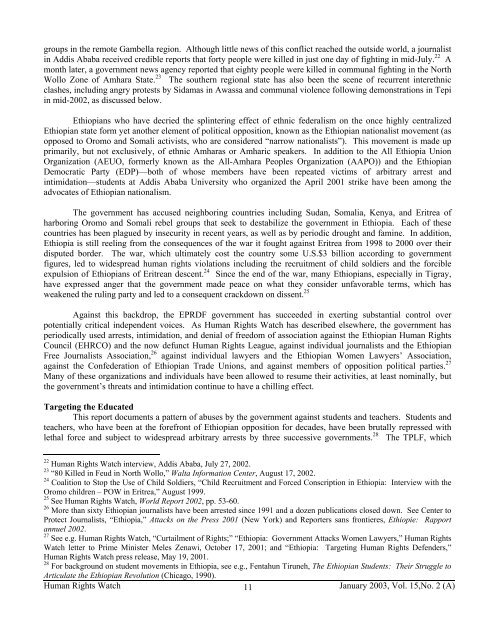Ethiopia lessons in repression: violations of academic problems, HRW
Ethiopia lessons in repression: violations of academic problems, HRW
Ethiopia lessons in repression: violations of academic problems, HRW
Create successful ePaper yourself
Turn your PDF publications into a flip-book with our unique Google optimized e-Paper software.
groups <strong>in</strong> the remote Gambella region. Although little news <strong>of</strong> this conflict reached the outside world, a journalist<br />
<strong>in</strong> Addis Ababa received credible reports that forty people were killed <strong>in</strong> just one day <strong>of</strong> fight<strong>in</strong>g <strong>in</strong> mid-July. 22 A<br />
month later, a government news agency reported that eighty people were killed <strong>in</strong> communal fight<strong>in</strong>g <strong>in</strong> the North<br />
Wollo Zone <strong>of</strong> Amhara State. 23 The southern regional state has also been the scene <strong>of</strong> recurrent <strong>in</strong>terethnic<br />
clashes, <strong>in</strong>clud<strong>in</strong>g angry protests by Sidamas <strong>in</strong> Awassa and communal violence follow<strong>in</strong>g demonstrations <strong>in</strong> Tepi<br />
<strong>in</strong> mid-2002, as discussed below.<br />
<strong>Ethiopia</strong>ns who have decried the spl<strong>in</strong>ter<strong>in</strong>g effect <strong>of</strong> ethnic federalism on the once highly centralized<br />
<strong>Ethiopia</strong>n state form yet another element <strong>of</strong> political opposition, known as the <strong>Ethiopia</strong>n nationalist movement (as<br />
opposed to Oromo and Somali activists, who are considered “narrow nationalists”). This movement is made up<br />
primarily, but not exclusively, <strong>of</strong> ethnic Amharas or Amharic speakers. In addition to the All <strong>Ethiopia</strong> Union<br />
Organization (AEUO, formerly known as the All-Amhara Peoples Organization (AAPO)) and the <strong>Ethiopia</strong>n<br />
Democratic Party (EDP)—both <strong>of</strong> whose members have been repeated victims <strong>of</strong> arbitrary arrest and<br />
<strong>in</strong>timidation—students at Addis Ababa University who organized the April 2001 strike have been among the<br />
advocates <strong>of</strong> <strong>Ethiopia</strong>n nationalism.<br />
The government has accused neighbor<strong>in</strong>g countries <strong>in</strong>clud<strong>in</strong>g Sudan, Somalia, Kenya, and Eritrea <strong>of</strong><br />
harbor<strong>in</strong>g Oromo and Somali rebel groups that seek to destabilize the government <strong>in</strong> <strong>Ethiopia</strong>. Each <strong>of</strong> these<br />
countries has been plagued by <strong>in</strong>security <strong>in</strong> recent years, as well as by periodic drought and fam<strong>in</strong>e. In addition,<br />
<strong>Ethiopia</strong> is still reel<strong>in</strong>g from the consequences <strong>of</strong> the war it fought aga<strong>in</strong>st Eritrea from 1998 to 2000 over their<br />
disputed border. The war, which ultimately cost the country some U.S.$3 billion accord<strong>in</strong>g to government<br />
figures, led to widespread human rights <strong>violations</strong> <strong>in</strong>clud<strong>in</strong>g the recruitment <strong>of</strong> child soldiers and the forcible<br />
expulsion <strong>of</strong> <strong>Ethiopia</strong>ns <strong>of</strong> Eritrean descent. 24 S<strong>in</strong>ce the end <strong>of</strong> the war, many <strong>Ethiopia</strong>ns, especially <strong>in</strong> Tigray,<br />
have expressed anger that the government made peace on what they consider unfavorable terms, which has<br />
weakened the rul<strong>in</strong>g party and led to a consequent crackdown on dissent. 25<br />
Aga<strong>in</strong>st this backdrop, the EPRDF government has succeeded <strong>in</strong> exert<strong>in</strong>g substantial control over<br />
potentially critical <strong>in</strong>dependent voices. As Human Rights Watch has described elsewhere, the government has<br />
periodically used arrests, <strong>in</strong>timidation, and denial <strong>of</strong> freedom <strong>of</strong> association aga<strong>in</strong>st the <strong>Ethiopia</strong>n Human Rights<br />
Council (EHRCO) and the now defunct Human Rights League, aga<strong>in</strong>st <strong>in</strong>dividual journalists and the <strong>Ethiopia</strong>n<br />
Free Journalists Association, 26 aga<strong>in</strong>st <strong>in</strong>dividual lawyers and the <strong>Ethiopia</strong>n Women Lawyers’ Association,<br />
aga<strong>in</strong>st the Confederation <strong>of</strong> <strong>Ethiopia</strong>n Trade Unions, and aga<strong>in</strong>st members <strong>of</strong> opposition political parties. 27<br />
Many <strong>of</strong> these organizations and <strong>in</strong>dividuals have been allowed to resume their activities, at least nom<strong>in</strong>ally, but<br />
the government’s threats and <strong>in</strong>timidation cont<strong>in</strong>ue to have a chill<strong>in</strong>g effect.<br />
Target<strong>in</strong>g the Educated<br />
This report documents a pattern <strong>of</strong> abuses by the government aga<strong>in</strong>st students and teachers. Students and<br />
teachers, who have been at the forefront <strong>of</strong> <strong>Ethiopia</strong>n opposition for decades, have been brutally repressed with<br />
lethal force and subject to widespread arbitrary arrests by three successive governments. 28 The TPLF, which<br />
22 Human Rights Watch <strong>in</strong>terview, Addis Ababa, July 27, 2002.<br />
23 “80 Killed <strong>in</strong> Feud <strong>in</strong> North Wollo,” Walta Information Center, August 17, 2002.<br />
24 Coalition to Stop the Use <strong>of</strong> Child Soldiers, “Child Recruitment and Forced Conscription <strong>in</strong> <strong>Ethiopia</strong>: Interview with the<br />
Oromo children – POW <strong>in</strong> Eritrea,” August 1999.<br />
25 See Human Rights Watch, World Report 2002, pp. 53-60.<br />
26 More than sixty <strong>Ethiopia</strong>n journalists have been arrested s<strong>in</strong>ce 1991 and a dozen publications closed down. See Center to<br />
Protect Journalists, “<strong>Ethiopia</strong>,” Attacks on the Press 2001 (New York) and Reporters sans frontieres, Ethiopie: Rapport<br />
annuel 2002.<br />
27 See e.g. Human Rights Watch, “Curtailment <strong>of</strong> Rights;” “<strong>Ethiopia</strong>: Government Attacks Women Lawyers,” Human Rights<br />
Watch letter to Prime M<strong>in</strong>ister Meles Zenawi, October 17, 2001; and “<strong>Ethiopia</strong>: Target<strong>in</strong>g Human Rights Defenders,”<br />
Human Rights Watch press release, May 19, 2001.<br />
28 For background on student movements <strong>in</strong> <strong>Ethiopia</strong>, see e.g., Fentahun Tiruneh, The <strong>Ethiopia</strong>n Students: Their Struggle to<br />
Articulate the <strong>Ethiopia</strong>n Revolution (Chicago, 1990).<br />
Human Rights Watch<br />
11<br />
January 2003, Vol. 15,No. 2 (A)
















